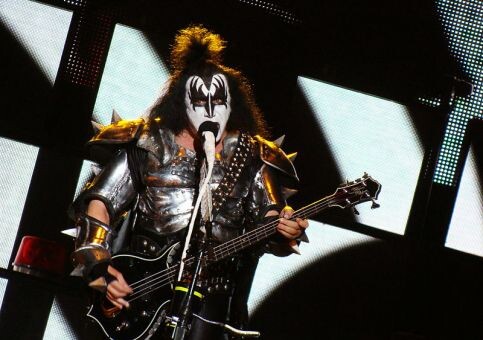The Electronic Intifada 29 March 2011

The unsavory performer Gene Simmons has called artists boycotting Israel “fools.” (Vitoria Gasteiz)
Gene Simmons has been known for a lot of less-than-savory things. His long tongue is probably his most infamous, and yet few have said much about his big, bigoted, misogynist mouth. The Kiss front-man, who was born Chaim Witz near Haifa, recently opened that mouth to call artists boycotting Israel “fools.”
Simmons is currently in Israel to film scenes for his reality show, Gene Simmons’ Family Jewels. In an interview with the Associated Press, he gave some rather condescending advice to those same artists: “The countries they should be boycotting are the same countries [where] the populations are rebelling … People long to be free … And they sure as hell don’t want somebody who’s a ruler who hasn’t been elected by them” (“AP Interview: Kiss bassist Gene Simmons says boycotters of Israel are ‘fools’,” 22 March 2011).
For his own part, Simmons has been a long and vocal supporter of Israeli and American foreign policy. He loudly stumped for both the invasions of Afghanistan and Iraq and in 2006, as Israel bombed Lebanon, he sent messages of support to Israeli soldiers. And his supposed liberalism hasn’t prevented him from describing Islam as a “vile culture” to The Sydney Morning Herald in 2004.
Now he’s directed this same bile at some of music’s most legendary figures. The Pixies, Gil Scott-Heron, Carlos Santana and Pink Floyd’s Roger Waters are only a few of the personalities who have lent their names to the cultural boycott over the past few years.
The call for an economic, academic and cultural boycott goes back to 2004, when groups, intellectuals and activists from within Palestine issued the call (“Call for academic and cultural boycott of Israel”). The past nine years have seen the call supported by a growing number of groups world-wide and since Israel’s attacks on Gaza in winter 2008-09 and its lethal attack on the Gaza Freedom Flotilla in May 2010, the amount of canceled gigs has greatly increased. Elvis Costello, who pulled out of two shows in Tel Aviv after the raid, explained his rationale on his website:
“One lives in hope that music is more than mere noise, filling up idle time, whether intending to elate or lament … Then there are occasions when merely having your name added to a concert schedule may be interpreted as a political act that resonates more than anything that might be sung and it may be assumed that one has no mind for the suffering of the innocent” (“It is After Considerable Contemplation …”).
Costello, along with many other artists like him, have been lambasted by countless voices both in the mainstream press and the world-wide blogosphere. Right-wing columnist and radio host Debbie Schlussel labeled him “scum,” and accused him of “appeasing” Hamas. Shuki Weiss, a high-profile Israeli concert promoter, called the boycott “cultural terrorism.” Indeed, Gene Simmons’ own words highlight the momentum that the cultural boycott of Israel has gained lately — and what a potential problem it’s become for Israel’s public image abroad.
Simmons is notably careful to put the whole question in terms of “freedom,” a rather oblique word that any politician is ready to trot out at a moment’s notice. The same interview notes that his own mother was a survivor of the Nazi Holocaust, which once again pulls the whole conversation about Palestine and Israel away from the realities of colonialism and boils the conflict down to a matter of “Jew vs. Muslim.” It’s a mistaken notion that nonetheless seems to jive with Simmons’ own “clash of civilizations” worldview.
Of course, at least in the interview, there’s no mention of the boycott on its own terms, no mention of the one word that Israel and its backers fear: apartheid. After all, to do so might put Simmons on history’s bad side.
It’s a potent line to cross. Those who struggled against apartheid in South Africa no doubt remember the loud and proud role that music played. Artists United Against Apartheid, launched in 1985 by Little Steven Van Zandt, garnered support from countless musicians. Run-DMC, Bruce Springsteen, Bonnie Raitt, Herbie Hancock, Joey Ramone, George Clinton, Peter Gabriel are just a few of the musicians who famously refused to play South Africa while apartheid remained intact.
Simmons wasn’t part of AUAA. But then, “integrity” has never been the first thing that comes to mind when one thinks of Kiss, a group who have eagerly lent their image to anything that will make them money — lunch-boxes, action figures, cartoons, soda commercials and credit cards have all been deemed worthy of the Kiss “brand,” but alas, not the struggle for human rights.
The real insult, however, comes in his insistence that artists should be boycotting the “countries [where] the populations are rebelling.” He conveniently skips over the fact that Egypt, Tunisia, Jordan and most of the other Middle East dictatorships have survived through steadfast support from Israel and the US. An example of this would be one of the key demands being fought for by those still struggling in Egypt — opening the border with Gaza!
You have to hand it to him though; Simmons has impeccable timing. His comments and visit to Jerusalem come right as Israel has launched a spate of fresh bombings of Gaza. Simmons, it seems, may have front-row seats to a crime against humanity. No doubt these particular segments of Family Jewels are going to be particularly stomach-turning. But while he runs his mouth off to no end, the fact remains that a growing number of musicians have decided Israel deserves nothing but silence from them.
Alexander Billet is a music journalist and activist living in Chicago. He runs the website Rebel Frequencies (http://rebelfrequencies.blogspot.com), and is a columnist for SOCIARTS. He has also written for Z Magazine, PopMatters.com, and CounterPunch. He can be reached at rebelfrequencies A T gmail D O T com.




